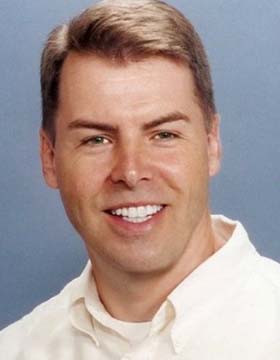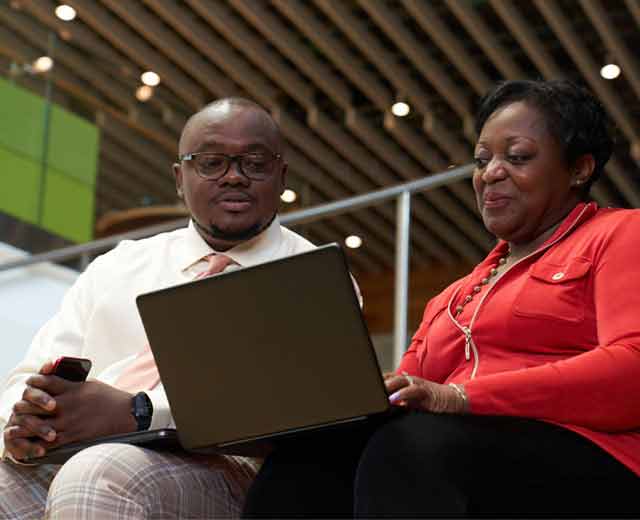In December, UMGC welcomed graduates from across the country and around the world to our winter Grad Walk event in Adelphi, Maryland. Unlike larger mass graduation ceremonies, Grad Walk is a three-day, in-person, graduation experience where graduates have their personal moment to celebrate their achievements with their families and friends literally by the stage.
As always, �������� connected with some of the graduates at the event, and in a series of interviews, they shared a little about themselves and their UMGC experiences.
Meet the Graduates
Erin Pickens is a U.S. Navy veteran and a mother of two young boys. She graduated with a BS in psychology and is currently working in a management position at a plasma facility.
Steven Carter received an MS in information technology with a specialization in systems engineering and a graduate certificate in systems engineering. He currently works as a software tester.
Najam Qurashi is a regional security officer dealing with embassies and consulates. He earned a master’s degree and a graduate certificate, both in cybersecurity management and policy.
Beverly Vickers received her BS in health services management. She is a full-time, in-home caregiver currently living in Hawaii.
We asked these graduates about a range of topics, including their choice of program and school, how their degrees and certificates have helped them in their careers, and how they benefitted from UMGC student services.
Q: Why did you choose UMGC?
ERIN PICKENS: “When I began my associate degree I was serving overseas, and we only had the choice between UMGC and a Texas college. Those were the two schools that had professors come out onto the ship to teach classes. I picked UMGC for my associate degree, and my experience with the school and the easy transition into the bachelor's degree was great, so I stayed with UMGC for my bachelor's as well.”
STEVEN CARTER: “I liked the availability to do classes online and not be held to being in a classroom at a certain time. I could just study after work on my schedule. And the systems engineering program at t �������� was really beneficial for me in the IT field. Being a software tester, I definitely learned a lot about verification, validation, and different IT concepts.”
NAJAM QURASHI: “I worked for Department of State with the special agents conducting investigations. While I was already using my bachelor’s degree in that job, another opportunity came up with overseas support for embassies and consulates that required dealing with a lot of engineers and technicians, so I transferred into that branch office. I did some research to figure out what I needed in terms of skills and credentials, and some of my colleagues who have attended UMGC mentioned that it would be a good school to look into.”
BEVERLY VICKERS: “It was my husband who actually told me about t ��������. He works for the Department of the Army, and he’d seen many of his peers and friends who’d graduated from UMGC from different bases. I checked it out, and what first caught my attention was the flexibility of studying online. I was looking for an online school, but one with credibility. The fact that t �������� is an accredited state university was very important to me, because that says credibility.”
Q: What drew you to this particular course of study?
ERIN PICKENS: “I've always been interested in psychology just because I've known a lot of great people—friends and family—who have been through hard times or horrible experiences. I've always been that ear, or that shoulder, or that . . . I don’t know . . . presence. That’s what really drew me to psychology, not just as it relates to leadership roles, though I do have that experience, but also just wanting to do something more and really delve into that field.”
STEVEN CARTER: “I’ve been working full-time in IT as a software tester, mostly for government contractors, and I was looking to grow into becoming a more senior systems engineer. The master’s program at t �������� fit well with my current career path.”
NAJAM QURASHI: “My job is focused toward risk management as well as policy—making sure foreign adversaries are not taking advantage of our citizens who are going overseas as diplomats. This master’s degree allowed me to learn about a lot of different enterprise solutions that are used across industries to secure PII (personal identifiable information), as well as servers, etc.—basically making sure folks are secure. I felt that, to fully understand my job as well as understand how the cyber realm works, it would be a good idea to take this (cybersecurity) degree.”
Q: Describe the quality of education you received in terms of the coursework, online classroom, your professors, etc.
ERIN PICKENS: “I felt like it was good quality. I liked the way you have to do a certain amount of interaction with your online classmates. That really helped to kind of push everybody along and get other perspectives. I had a lot of really good professors who were very responsive—you could get ahold of them, and they’d get right back to you. . ...Being able to do life and do school was a good experience through UMGC.”
STEVEN CARTER: “I would rate it very high as a quality education. I learned a lot throughout the program about the theories and practices for managing an engineering project through the whole system lifecycle and the different concepts related to systems engineering, like model-based engineering and systems engineering theories. That just really went well with what my current career path is.”
NAJAM QURASHI: “Honestly, the first course that I took was very difficult for me, but it allowed me to brush up on my writing and understand how the classes are structured, as well as communicating with the professors. It made me conduct more research and be more organized as I took the course, which helped me tremendously throughout my whole career in completing this degree. My professors were excellent. They went above and beyond to make sure I was completing my assignments on time as well as guiding me whenever I was kind of misstepping in any way.”
BEVERLY VICKERS: “The quality of education is fantastic. The way UMGC does things, the efficiency of their system, it has helped me become the best student that I could be. And if you need evidence, I say humbly (but gladly) that I'm graduating as part of the top of the class, and a member of the Phi Kappa Phi honor society. The professors are great, and if you look at their background, they actually work in the field. Not only did they teach me how to manage healthcare, but the wisdom they shared from working in health services was invaluable. I think UMGC is the future of school and they're just going to get better and better.”
Q: What was the motivation for pursuing a certificate, and what does it enable you to do?
STEVEN CARTER: “I had worked at various companies before with a lot of systems engineers, electrical engineers, mechanical engineers, etc. I knew they used systems engineering practices daily for their jobs, and that that was a role I thought I might want to grow into, from being a software tester to becoming a more senior systems engineer. In the shorter term, what I learned in the certificate program, the skills I gained, I could apply right away at work.”
NAJAM QURASHI: “In my current position, I deal with all these embassies and consulates. They work on vulnerability assessments and high-level reports in securing the ambassadors and diplomats that are overseas. While the master’s degree taught me how to understand what’s going on with these reports, among other things, the certificate program was very essential in understanding basically how cybersecurity policies work, the risk management, the publications of federal standards, and how they correlate with what's going on in the field today. It was kind of a helpful add-on as I was getting my master's.”
Q: Did you avail yourself of student services?
ERIN PICKENS: “I had two different advisors, I think they call them MECs (military education coordinators). And they were both wonderful. They would check in pretty often just to see if I had any questions or needed anything. When I finished each semester, they'd reach out and make sure I was looking ahead to the next semester. ‘What was I going to enroll in? Did I need help choosing from my AAR,’ etc. They were both really great resources.
“I used the APA guidelines a lot for my papers, and just having that reference, by some of my last classes, I had APA down. And there’s the Effective Writing Center where you could send in your paper, have someone read through it, and send it back with comments. I used a lot of those things.
“I had to drop a class at one point, and I actually failed one at another point. That’s when I really appreciated the services at t ��������. They made it so easy to get back on the horse and retake the classes later, and I appreciated the flexibility of being okay if I put this one on hold for a semester, knowing that next semester I’d be able to pick it up. So, it took me six or seven years to get both of my degrees—I started a lot later in life than I had planned—but you know, that's what we're here for. I stuck through it, and I finally did it. I've just really appreciated having a college like UMGC having such great advisors and resources.”
STEVEN CARTER: “I was in contact with my success coach, Rachel P., and she helped guide me through class selections. But it was pretty much just one class right after the other, so I knew going in exactly what I would need to do to get it done. And it was a really easy path forward.
“One good aspect was that all the materials were online resources and white papers from the professors, so you knew you were getting quality material. But you didn't have to pay for the books. That was a good benefit.”
BEVERLY VICKERS: “I availed myself of all the student resources I could, and they helped me a lot. Whenever I had a question, I could contact my success coach, my professors, the Effective Writing Center, and whenever I contacted them, they'd respond right away. I could use the library 24 hours a day. And I used the Turnitin program where, before you submit your assignment, one of the resources there is to check to make sure that there's no online plagiarism and all that. They were all so nice and very helpful.”
Q: What do you see as your next success?
ERIN PICKENS: “I’m thinking in terms of a master's program now. So I'm going to look into what I have close to me and what they provide. But if I'm going to go online, then I'll definitely be back at t ��������.”
STEVEN CARTER: “I've been in software testing for a number of years now. Next, I'd like to get into either managing a software test team or being a systems engineer. That's where I'm hoping to get with this degree.”
NAJAM QURASHI: “So, I haven't taken any certs yet because I've been so busy with work and school, but I'm working on getting my Security+ and then CISSP. I have organized my studies to pursue them in the coming year, and now that I have my degree, that's what my next goal is. My next work assignment should be dealing with cyber security as a policy advisor—establishing certain standards for our organization so we can develop countermeasures to prevent bad things from happening.”
BEVERLY VICKERS: “I've made a lot of friends here (at t ��������), and I still talk to my peers from my previous classes. Everybody's coming from different walks of life, and I think one of the greatest things that happened to me here is I've met all these beautiful people from various backgrounds.”
Reference on this webpage to any third-party entity or product does not constitute or imply endorsement by UMGC nor does it constitute or imply endorsement of UMGC by the third party.

/blog-umgc-online-tutoring-linklist-shutterstock-2178493721.jpg)



Share This